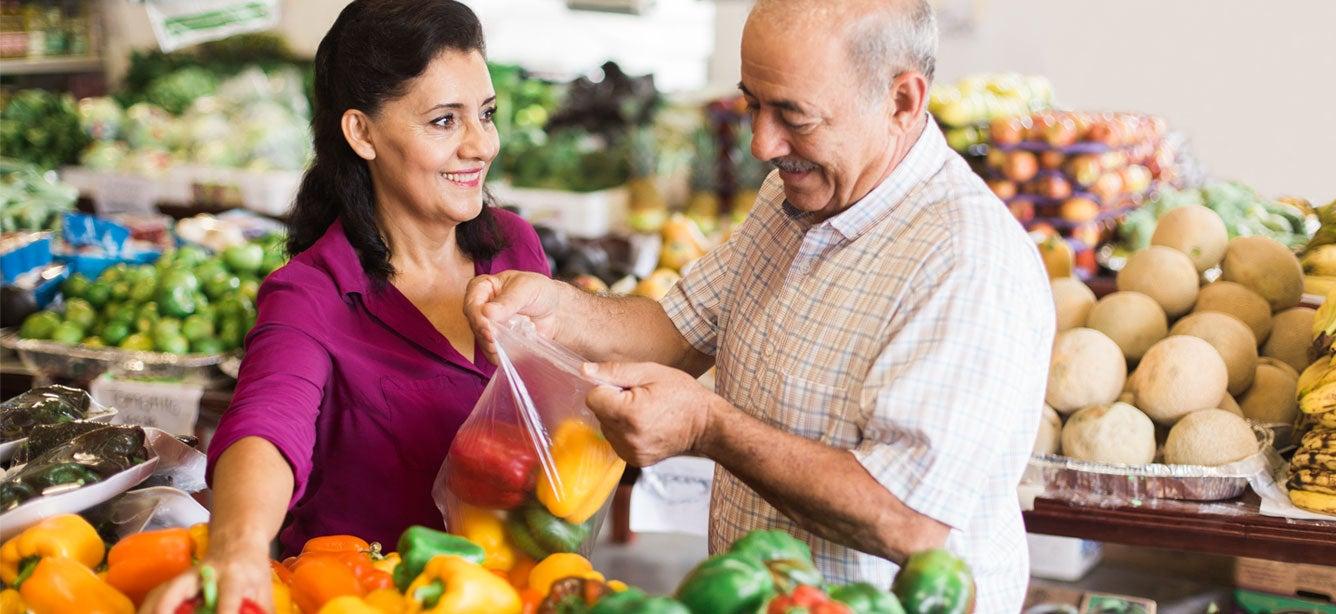
Many people living in Indian Country reside in food deserts—areas with few grocery stores or access to fresh produce and healthy foods. A recent effort in one New Mexico Pueblo has sought to remedy this problem by reintroducing indigenous foods into the diets of Tribal elders and connecting them with other sources of food assistance.
It began with a partnership and budding friendship between two people, which became a food sovereignty pilot. Thank you, my native brother, Lyle."
Between July and September 2021, the native Tewa peoples of the Santa Clara Pueblo have been able to farm their own fruits and vegetables and serve this harvest to over 500 elders living on their reservation. With funding from the Healthy Food Community of Practice coordinated by the Walmart Foundation (which consists of national partners in the field of nutrition, food access supports, think tanks, and organizations like NCOA focused on serving older adults), this pilot sought to:
- Chart a new course for in-home food delivery offerings and move away from processed, sugary, and non-culturally relevant food
- Enhance congregate senior center meals by incorporating locally sourced, culturally relevant, and nutritious foods
- Establish a baseline for food sovereignty--the idea of “our foods for our people” for the local community being served
- Include access to benefits to strengthen supports for the recipients of these newly harvested meals
This effort came together in partnership with our Benefits Enrollment Center (BEC) out of Northern New Mexico, Rio Arriba County Department of Health and Human Services, via the BEC program lead and tribal liaison, Lyle Lomayma. Lyle is an enrolled member of the Santa Clara Pueblo and of the Hopi Nations of the four corners region of the U.S. Through Lyle, I met Vallee, who is also an enrolled member of the Santa Clara Pueblo and the program lead for this effort with the Santa Clara Pueblo Department of Agriculture.
From farm to the elders' tables
The $100,000 pilot funding went toward purchasing a new tractor (plus manual farming equipment and seeds), hiring a farm worker, recruiting a team of pueblo volunteers, and providing tractor service to the individual plot owners who have crops in their backyards but no way of tending to them on their own. The tractor was also used to gather crops on one of the pueblo’s farms.
In addition, the Department of Agriculture manned a community garden and greenhouse to produce the crops needed to feed the target goal of 500+ tribal elders. This blanketed approach yielded a rich crop of fruits and vegetables, including white and blue corn, green chiles, squash, cucumbers, tomatoes, pumpkins, beans, and a variety of other local fruits native to that community.
On one of the days of food preparation at a local senior center, the team of volunteers and staff of the Department of Agriculture made a salsa out of the crops they yielded, which was shared with more than 100 elders in celebration. The harvested fruits and vegetables helped to enhance and diversify the home-delivered food options for over 500 elders living on the reservation in the three months in which the pilot operated. At the same time, Lyle and the BEC team approached those receiving deliveries about screening for food and other benefits that could stretch their budgets further.
Challenges posed by the pandemic
Due to the pandemic, there were two impediments to this pilot, which included the extended closure of all the senior center sites, eliminating the process of serving meals in a congregate setting, and the health impacts of COVID-19, which made it difficult to reach the Tribal elders for the purposes of benefits screening and enrollment.
As a result, the team focused all energies on creative packaging of home-delivered meals and getting the word out about this new locally sourced healthy and culturally relevant food option, and how local and federal benefits can add to the menu of supports available to the elders on the reservation. This approach was very well received and created a demand for more “food from home.”
Impact
The key measures of this short pilot included total number of Tribal elders served a locally sourced meal, which in the three months totaled 485. It also included the total number of homes who received tractor service, 63 unique households, bringing the total of tribal elders served to 548 in three short months.
Of the 548 elders who were provided locally grown and culturally relevant healthy food options, roughly 300 were screened and 290 were connected to one or more health and economic benefits. This was achieved by Lyle and the BEC team through in-person outreach events held on the reservation in the form of senior farmers market outreach, as well as in educating the community on firewood usage as it relates to the federal LIHEAP program.
The BEC’s outreach and enrollment efforts were the last ingredient in the holistic approach of establishing a comprehensive approach to food sovereignty. In addition, the impact of the purchase and use of the new tractor allowed for over 85 acres to be plowed in the short time of this pilot.
Reaching more Native elders
The impact of this pilot has generated interest/curiosity within the pueblo communities of Northern New Mexico. The future vision is to replicate this work where it is deemed desirable and where the community comes together in similar fashion to the people of the Santa Clara Pueblo.
The benefits of eating foods that are familiar, culturally relevant, healthy, and bring a sense of communing back to their recipients is priceless. When you add to that by providing access to community supports, including financial and health benefits, this may very well create the ultimate recipe for food sovereignty.



